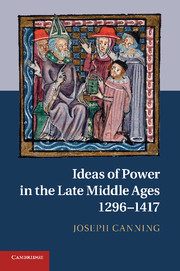Book contents
- Frontmatter
- Contents
- Preface
- Abbreviations
- Introduction
- Chapter 1 Ideas of power and authority during the disputes between Philip IV and Boniface VIII
- Chapter 2 Dante Alighieri: the approach of political philosophy
- Chapter 3 Marsilius of Padua
- Chapter 4 Power and powerlessness in the poverty debates
- Chapter 5 The treatment of power in juristic thought
- Chapter 6 The power crisis during the Great Schism (1378–1417)
- Conclusion
- Bibliography
- Index
Chapter 4 - Power and powerlessness in the poverty debates
Published online by Cambridge University Press: 25 October 2011
- Frontmatter
- Contents
- Preface
- Abbreviations
- Introduction
- Chapter 1 Ideas of power and authority during the disputes between Philip IV and Boniface VIII
- Chapter 2 Dante Alighieri: the approach of political philosophy
- Chapter 3 Marsilius of Padua
- Chapter 4 Power and powerlessness in the poverty debates
- Chapter 5 The treatment of power in juristic thought
- Chapter 6 The power crisis during the Great Schism (1378–1417)
- Conclusion
- Bibliography
- Index
Summary
The conflict over the question of apostolic poverty became the dominant issue in the church at the end of the thirteenth century and in the first half of the fourteenth century. In essence, the dispute was a theological one with ethical and spiritual implications – how to live the perfect Christian life. At first sight, it would not appear to be a political question at all. After all, poverty is not normally (or ever) advocated as a political prescription – rather, it is to be avoided or prevented. But, as will already be clear, this particular crisis was not a purely ecclesiastical matter: the defenders of the poverty ethos and their opponents, in addressing the whole issue of poverty and property, raised questions concerning power, powerlessness and legitimate authority which had fundamental implications for political thought.
The problem of poverty and possessions has been a perennial and central one for Christianity. The ethos of the New Testament was one of suspicion of riches. Examples abound. Christ stated that it was easier for a camel to go through the eye of a needle than for a rich man to enter heaven; he enjoined the rich young man to abandon all his possessions if he wished to be perfect and follow him; and he expressed a preferential option for the poor. The disciples sent on preaching journeys were to rely on alms and community of property was practised by the early church. Christ himself was not rich. In medieval Christianity there was a tension between the poverty ethos and the justification of possessions, including those of the church. Attitudes to property were also informed by fundamental presuppositions of medieval Catholicism: that the spiritual order was hierarchically superior to mere material things; an anti-materialism that assumed that worldly goods hindered human fulfilment; and the influence of Neoplatonic philosophy.
- Type
- Chapter
- Information
- Ideas of Power in the Late Middle Ages, 1296–1417 , pp. 107 - 132Publisher: Cambridge University PressPrint publication year: 2011



